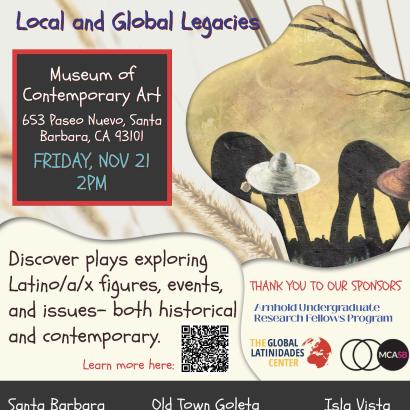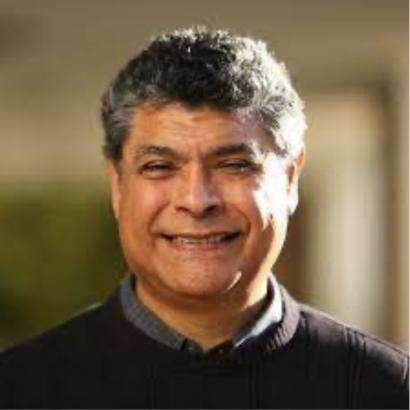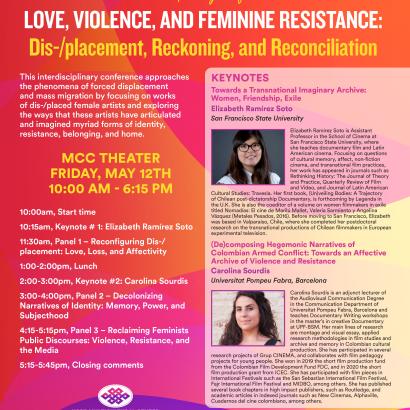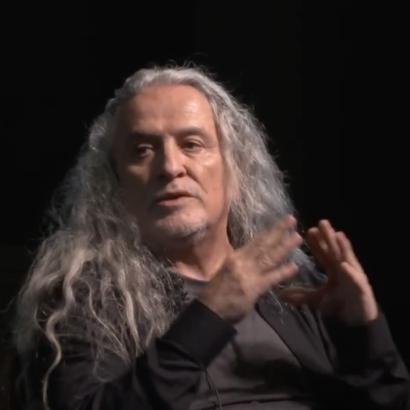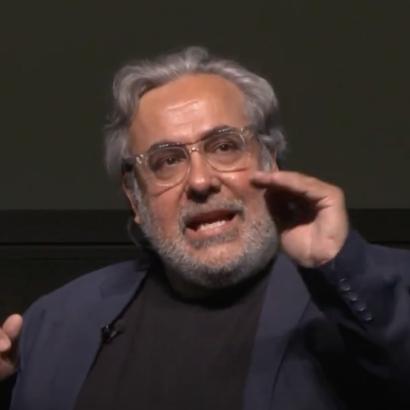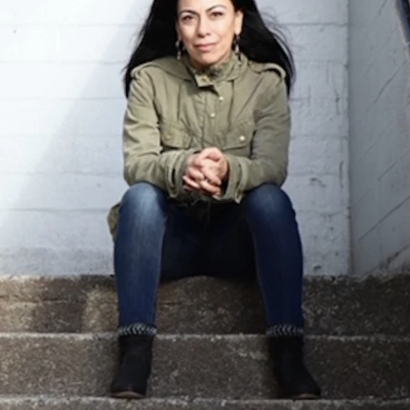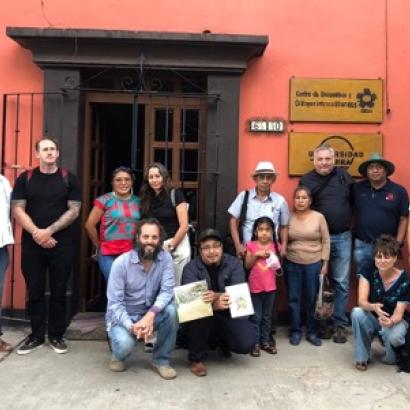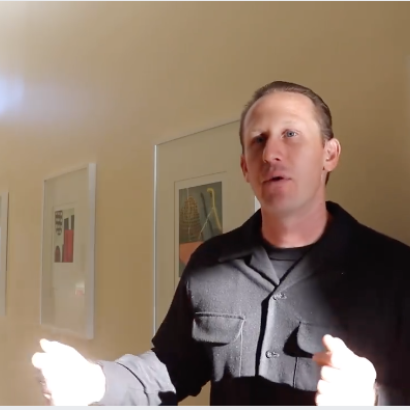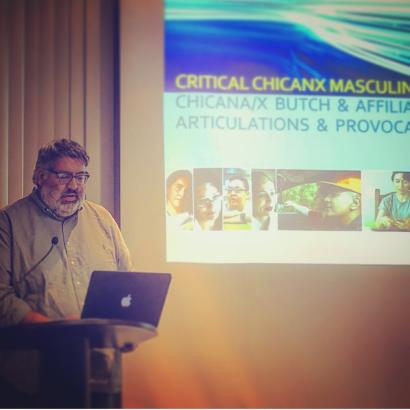Global Latinidades Center pilot “Historias" presents "Golden State Stories: Local and Global Legacies"
The playwriting class “Historias de Old Town Goleta Y Isla Vista / Isla Vista and Old Town Goleta Stories” is organizing a series of performances the weekend preceding Thanksgiving. This weekend of free theatrical programming for residents of Old Town Goleta, Isla Vista, and the broader Santa Barbara County community is a part of the Global Latinidades Center’s Local/Global Pedagogy and Praxis Initiatives. A major aim is to highlight the significant presence and role of Chicana/o/x and Latina/o/x, as well as broader working-class residents in Santa Barbara County, with a focus on Old Town Goleta and the IV communities surrounding the university.
Global Latinidades Center Research Assistant Receives Clinton Terrell Receives Prestigious UC Chancellor's Postdoctoral Fellowship Award
English Department Doctoral Candidate Clinton Terrell Receives Prestigious UC Chancellor's Postdoctoral Fellowship Award for 2025-2026 Academic Year.
He previously received a Ford Pre-Doctoral Fellowship, and a Ford Dissertation Fellowship. Clinton's dissertation committee includes Ben Olguin (Chair), Bernadette Andrea, Felice Blake, Joy James (Williams College), and Robert Weide (Cal State LA). As a CPFP, he will be working with Principal Mentor Nigel Hatton at UC Merced and Co-Mentor Dylan Rodriguez at UC Riverside. His dissertation topic is titled, "Convict Nationalism: An Historical Analysis of Convict Identities, Race Formation, and the Poetics of Solidarity in Twenty-First Century Prisoner Life Writing."
Chicanx author and professor Jesús Rosales (event in Spanish)
Raised in Santa Barbara, CA, (born in Durango, México) Jesús is a Chicano novelist and professor committed to recuperating and preserving Chicanx writing in Spanish. He will be reading from his novel Marco Solís: El hombre de arena (2020), the first Chicano novel about growing up in Santa Barbara. The novel addresses racism, gentrification, various forms of alienation, and much more. The reading and discussion will be in Spanish.
Jesús (nacido en Durango, México) creció en Santa Bárbara, CA y reside en Arizona. Es un novelista y profesor universitario que se dedica a preservar e investigar la historia de la literatura chicana escrita en español. Platicará de Marco Solís: El hombre de arena (2020), la primera novela que trata sobre crecer siendo chicano en Santa Bárbara. La novela incluye temas como el racismo, la gentrificación, varias formas de alienación, y entre otros muchos. Su charla será en español.
Interdisciplinary Conference: Love, Violence, and Feminine Resistance: Dis-/placement, Reckoning, and Reconciliation
Love, Violence, and Feminine Resistance: Dis-/placement, Reckoning, and Reconciliation
Afecto, violencia y resistencia femenina: Desplazamiento, reconocimiento y reconciliación
May 12, 2023
This interdisciplinary conference approaches the phenomena of forced displacement and mass migration by focusing on works of dis-/placed female artists and exploring the ways that these artists have articulated and imagined myriad forms of identity, resistance, belonging, and home. This conference invites paper proposals, video essays (finished and works-in-progress) to reflect on how the material and symbolic dilemmas of dis-/placement, definitions/categorizations of “female”, and conceptualizations of inside and outside—from the boundaries of nation states, to the familial, to those of race, class, gender, and sexuality—are negotiated across aesthetic categories and transnational geographies.
The Last Brown Beret (Film Screening and Discussion)
Del Zamora joins Ben Olguín (English, UCSB) for a post screening discussion of The Last Brown Beret.
Based on a popular play by Alfredo Ramos, The Last Brown Beret follows a group of 1960s East LA activists as they reunite for a funeral for one of their former comrades. At the afterparty, one of the old “brown berets” gathers the others in the garage where they used to meet as young revolutionaries. Together, they attempt to come to terms with what they achieved for their communities, and what was left undone. Written, directed, and produced by acclaimed actor Del Zamora, the film is a rollercoaster ride of emotions, full of love for the Chicanx people and their history of advocacy.
The First Rainbow Coalition (Film Screening and Discussion)
In 1969, the Chicago Black Panther Party began to form alliances across lines of race and ethnicity with other community-based movements in the city, including the Latino Young Lords Organization and the southern whites of the Young Patriots organization. Banding together in one of the most segregated cities in postwar America to collectively confront issues such as police brutality and substandard housing, they called themselves the Rainbow Coalition. But by 1973, the Coalition had collapsed under the weight of relentless harassment by local and federal law enforcement. Although short-lived, it had an outsized impact: breaking down barriers between communities, the movement created a permanent shift in Chicago politics and an organizing model for future activists and politicians across the nation. Told through rare archival footage and interviews with former Coalition members, filmmaker Ray Santisteban’s The First Rainbow Coalition took more than a decade to complete and depicts the story of a powerful movement and the enduring legacy it left behind.
Director/producer Ray Santisteban joined moderator Ben Olguín (English, UCSB) for a post-screening discussion of The First Rainbow Coalition.
INTERNATIONALLY ACCLAIMED AUTHOR, ACTOR, AND PLAYWRIGHT CARMEN AGUIRRE, Whose Work Explores Exile, Alienation, and Revolution, to visit UCSB January 11-12, 2023
We are thrilled to announce that Carmen Aguirre, Chilean-Canadian author, actor, and playwright will visit UCSB on January 11-12, 2023 for two events. Much of her writing has been autobiographical and unabashedly left wing, exploring themes of exile, loss, alienation, and isolation, but also hope and resistance. A campus reading and discussion will take place on Jan 11 at the at the MCC Theater from 7-8:30pm and a community centered mini-reading and workshop on Jan 12 from 6-8:30pm at the MCC Lounge. Both events will be led by Carmen Aguirre. Free dinner will also be provided for all participants.
La Manplesa: An Uprising Remembered
On May 5th, 1991, people took to the streets of Washington D.C.’s Mount Pleasant neighborhood to protest the police shooting of Daniel Gomez, a young man from El Salvador. Through testimony, song, poetry, and street theatre, La Manplesa: An Uprising Remembered (2021) weaves together the collective memory of one of D.C.’s first barrios, and dives into the roots of the ‘91 rebellion. These formerly untold stories shed light on the impetus behind resistance movements and the complicated relationships between people marginalized by our systems and the police. La Manplesa explores the deep historical connections between immigration, multicultural communities, gentrification, displacement, and the long and deep relationship between art and activism. Poet and artist Sami Miranda and filmmaker Ellie Walton join Ben Olguín (English, UCSB) for a post-screening discussion of this powerful documentary.
The Global Latinidades Center Launches Pilot Workshop with Universidad de la Tierra, Oaxaca!
The Center for Convivial Research and Autonomy (CCRA), a transterritorial research collective, in collaboration with the Global Latinidades Center at the University of California, Santa Barbara, (UCSB); Academy of Media Arts, Cologne, (KHM); New York University (NYU); and Universidad de la Tierra, Oaxaca, Mexico will convene an autonomous summer learning space, or ateneo, to be held virtually (via Zoom) and in person in Oaxaca. This unique convergence brings together researchers, public intellectuals, and grassroots activists for reflection and action engaging critical issues associated with what the Zapatistas theorize as the 4th World War, understood as a longstanding counterinsurgency, ongoing war against subsistence practices and knowledges, and imposed forgetting and oblivion. Specifically, we want to collectively share experiences and insights pursuant to effective theories and practices that challenge elements of the 4th World War that include, for example, counterinsurgency, militarized policing and border enforcement, the international carceral state and other forms of informalized gendered violence while also engaging the co-construction of autonomous, convivial alternatives to the endemic violences of late racial patriarchal capitalism.
The Global Latinidades Center Completes Pilot AfroLatinidades Institute in Summer 2022!
The UCSB AfroLatinidades Institute is a multifaceted component of the Global Latinidades Center that participates in the recovery and analysis of the African roots of Latinx history, culture, and identity. The Global Latinidades Center has assembled a team of researchers, educators, students, and community people in pursuit of a broad-based vision to further globalize the field of Latinx Studies, which necessarily involves a recentering of African lineages as part of this initiative. The AfroLatinidades Institute is thus central to the Global Latinidades Center.
Outlaw(ed) Intellectuals: Critiquing Structures of Power from Within
This two-day conference was organized by formerly incarcerated graduate and undergraduate students at UC Santa Barbara whose areas of studies range from literature to sociology and school psychology, and all intersect with the field of critical prison studies. The purpose of this conference was to bring formerly incarcerated scholars and abolitionist intellectuals from around the country to gain an understanding of the different strategies that scholar activists employ for conducting solidarity work in different geo-political contexts. Our presenters included UW Tacoma Psychology Professor Christopher Beasley, NYU PhD candidate of history Michelle Jones, Santa Barbara Youth Counselor Ishmael Huerta, community organizer and Homies Unidos Program Director Alex Sanchez, Cabrillo College Sociology Professor Sadie Reynolds, and UC Berkeley PhD candidate of Education Davíd Maldonado. Our keynote speaker was Williams College Africana Studies Professor Joy James who spoke on the politics of abolition and prison work in the academy and how we navigate the matrix of reformist discourse while maintaining a revolutionary praxis. See the schedule of activities for more information. See video of co-organizer Clint Terrell, UC Berkeley graduate and Doctoral Candidate in English at UCSB, discuss the rationale for the conference.
Critical Masculinities Colloquium: Reorientations & Futurities
The symposium is shaped by ongoing academic and public discussions on the issue of futurity, as exemplified by queer futurity, Afrofuturism, and Hillary Clinton’s resurfacing of the 1970s feminist phrase, “the future is female,” in her presidential campaign. The symposium seeks to foster an open discussion on even the possibility of a future for (critical) masculinities, especially given the toxicity of masculinity that the #metoo movement has exposed.
